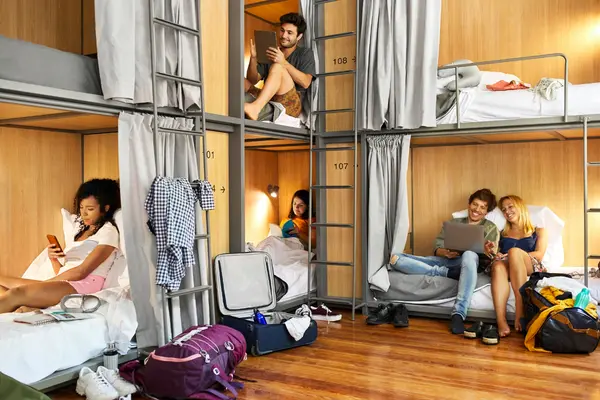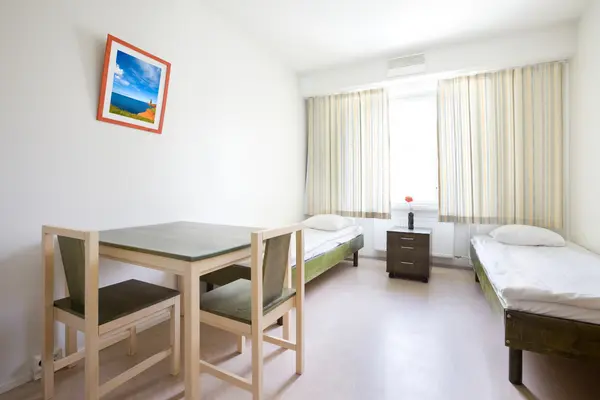College dorm life comes with its own set of rules and when it comes to appliances, microwaves are often at the top of the “can I bring this?” list. So, are microwaves allowed in dorms? The answer isn’t a simple yes or no. It really depends on the school (and sometimes the specific dorm building).
Let’s break it down.
Why Some Schools Say Yes (and Others Don’t)
Dorms aren’t just small—they’re wired for safety. That’s why colleges set rules about what you can plug in. Here’s what’s usually behind those rules:
- Fire Safety: Microwaves can be a fire risk if misused.
- Power Load: Too many high-wattage appliances can trip circuits.
- Space Constraints: Some rooms just don’t have room for extra gear.
When Microwaves Are Allowed
Good news—many schools do allow them, as long as you follow a few guidelines. You might see rules like:
- Wattage Limits: Often 700 watts or less.
- One Per Room: To avoid overloading outlets.
- Approved Units Only: Some schools only allow specific brands or models.
MicroFridge: The Dorm MVP
Some colleges offer or require MicroFridge units—a mini-fridge and microwave combo made just for dorms. They’re pre-approved, energy-efficient, and designed with student safety in mind. If your school has this option, it’s usually your safest (and easiest) bet.
No Microwave? No Problem
If microwaves aren’t allowed in your room, you’ve still got options:
- Communal Kitchens: Most dorms have shared spaces with microwaves.
- Residence Hall Lounges: Common areas often have small cooking stations.
- On-Campus Dining Halls: A quick stop at the café can save you when the cravings hit.
What You Should Do First
Before buying or bringing anything, do a quick check:
- Visit Your School’s Housing Website – Look for appliance policies.
- Contact Residence Life – Ask directly if you’re not sure.
- Ask About Rentals – Some schools rent approved appliances during move-in.
From Personal Experience…
I brought a microwave freshman year without reading the rules (rookie mistake). Five minutes after unpacking, I had to repack it and haul it back to the car. Since then, I always check first—and I tell every new student I meet to do the same. Saves time, hassle, and back pain.
Final Thoughts
Microwaves in dorms aren’t a guarantee—but with a little planning, you can figure out what’s allowed, what’s not, and what options you have either way. Whether it’s your own compact unit or the shared microwave down the hall, a warm meal is never too far away.
Commonly permitted appliances in dorms include:
Mini refrigerators, Blenders, Electric kettles, Rice cookers, Slow cookers, and Small coffee makers.
Why Are Microwaves Not Allowed In Dorms?
Most institutions are rigid about students cooking in their rooms. They have a list of what to bring and what not to bring in the dorms. Our research shows that the microwave is among the cooking gadgets colleges restrict in the resident halls. Others include rice makers, ovens, open heating elements, and many more.
So, your college may not allow microwaves in dorms due to safety concerns. Approving such appliances is dangerous and can cause electrical system overload. Overloaded systems constitute a significant cause of accidental fires in students’ rooms. Also, microwaves, toasters, and cookers are heavy power consumers.
Allowing each student to come with cooking gadgets may not be realistic because of the population. Besides the risk of fires, the rooms may need to be more spacious to house a fridge, cooker, microwave, and other gadgets. Also, operating many appliances may cause an overload and electrical outages for essential equipment in the institution.
Do Dorms Come With Microwaves?
Many colleges in the US have spacious student rooms that can accommodate several gadgets. That’s a move to give more freedom to occupants. But this freedom comes with various risks, including accidental fires.
Some institutions have modified student resident halls and built community kitchens. Any student can walk in and cook, toast, or warm their meals here. The facilities limit the need for the students to bring microwaves and other gadgets into the school. It saves money and keeps the rooms safe from accidental fires, injuries, and deaths.
Colleges or universities that do not allow students to bring cooking appliances to dorms come with communal microwaves.
The common kitchen comes with microwaves and cookers, irons, toasters, blenders, coffee makers, air fryers, slow cookers, electric kettles, and more kitchen appliances. As you would expect, communal gadgets will be less effective than a personal one.
However, these are better than none. To be sure, you can enquire if your college allows cooking appliances in student rooms. The housing policy document is also available on the college website. Visit and make inquiries where the information is scanty.
Can You Have A Microwave In Asbury University Dorm Room?
When moving into Asbury university, there are items that you should purchase for use in the residence hall. The microwave is not on the list. Asbury University requires all its students to abide by the State health and fire regulations that bar any form of cooking in dorms.
You cannot possess any appliance with a heating element, including microwaves, cookers, irons, and coffee makers. But you can use the gadgets in designated or common areas.
Do Tooker House Dorm Rooms Come With Refrigerators And Microwaves?
Tooker House is one of the learning institutions in the US with modern accommodation facilities. The college strives to keep all learners comfortable. At Tooker House, you have two options where you can choose to buy cookware, such as microwaves and rice cookers.
The student residence has kitchens and dining rooms with refrigerators and microwaves for students’ use. These are communal facilities so that any occupant can use the appliances. All users must adhere to the institution’s health and safety regulations when cooking. That includes cleaning the devices after use.
Also, students have permission to bring personal mini-microwaves that have a 700-watt usage or less. The university housing department only allows mini-fridges that are 4.0 cubic ft. Using these gadgets requires maximum caution to safeguard the facility against fire. While cooking in the room, follow the Tooker House dorm rules and regulations to stay safe.
Is Microwave Radiation Bad In Dorm Room?
For a long time, people have perceived microwaves as unsafe. They know that the gadgets radiate, exposing users to harmful waves that cause cancer.
This debate isn’t going anywhere and continues on many platforms; which is the truth? Is microwave dangerous to use? Researchers have come out clear that microwaves are safe gadgets. The ovens are unsafe if you misuse them. Injuries from microwave radiation rare are only possible due to lack of maintenance and improper use.
So, using your microwave in your dorm room or home will not cause radiation if the microwave is in perfect condition. The modern ones have a special shield that prevents harmful waves from escaping. Only high-powered microwaves can adversely affect human health, especially the central nervous system.
Also, microwaves rarely cause fires unless you use prohibited material like foil while cooking. Never use metal in the oven, as it can spark a fire. To stay safe, adhere to the user instructions and your institution’s dorm room rules and regulations.
Watch out for these tips when using a microwave in your dorm room;
- Read and adhere to the manufacturer’s installation procedures. Follow the operating and safety precautions.
- Never attempt to use unapproved cookware in your microwave oven.
- Metal bowls, twist ties, and aluminum foil can cause arcing in your microwave and cause a fire.
- Do not dry or sterilize your clothes in your microwave, as they may catch fire.
- Cleaning your microwave regularly reduces fire potential.
- Keep your oven unplugged when cleaning and also when not in use.
- Recycled paper (e.g., paper towels) can ignite a fire in microwave ovens. Use approved-only papers and towels.
- Overheating wheat bags in microwaves pose a fire risk. Follow the safety sheet instructions.
- Do not heat combustible liquids and foods in your microwave, as they may cause explosions and fire.
- Microwaved foods can be extremely hot. Wait for food to cool for about 1 minute before removing.
- Do not use a faulty microwave oven in your dorm room. Call the manufacturer’s service desk for return, replacement, and repairs.
- In case of a fire outburst in your microwave, turn it off and unplug it from power. Leave the microwave door closed and call the college emergency line for help.
Is There A Microwave Restriction Living In Dorm Room?

The freedom that comes with a microwave in your dorm room includes cooking at your convenience. You do not need to queue to warm your food; no one forces you to clean the communal facility that houses the appliances.
Of course, this is a learner’s dream, but it comes with a cost—risk of fires, property loss, injuries, and sometimes death. So, many learning institutions have revoked this freedom. They are now restricting microwaves in dorm rooms.
However, not all colleges have microwave restrictions in dorm rooms. The regulations depend on each institution.
As a student, you must know that the limits are for good reasons, including fire protection in dorms. Most dorm fires occur due to errors while using cooking equipment. Many colleges enforce the restrictions and provide safe and fully-equipped cooking areas. Also, students cook with close monitoring by members of staff.
Should You Have A Microwave In Your Dorm Room?
You want to be as comfortable as possible in your new learning environment. Time is of the essence, and you may want to save as much as possible to improve your performance. Making meals should consume a little of your time.
The best gadget to carry alone will be a mini-microwave. This oven and several other appliances can help you avoid the drama that comes with shared cooking appliances, including queueing during meal preparation. Your gadget will be more effective than the communal one, plus you can cook several meals as you like.
Read more: Best Small Countertop Microwave
Before buying, find out whether the oven is among the items you can bring to your dorm. You can have a microwave in your dorm room if your institution’s housing rules allow it.
Again, having the machine in your dorm room has more benefits. But if your college restricts cookware in dorms, you can use the one in the shared kitchen.
What Size Microwave Can You Have In A Dorm?
Bringing a jumbo microwave into your dorm isn’t ideal. But you do not know the best size. The rooms may not be spacious enough to accommodate all the cooking gadgets you may want to bring along.
Mini-gadgets will be ideal so that you can have space for other items. So, even before you seek clarification from your college housing department, set your mind to a mini-microwave, just enough for a single person.
The information from the housing desk is crucial. Ask about the limitations if they confirm that they allow microwaves and other appliances in dorm rooms. Most limit you on size and wattage due to the small dorm space and power consumption that come with large gadgets.
The department will mostly recommend a small microwave measuring up to 0.5-0.7 cubic ft. Don’t worry. This size is enough to fit a standard 10-inch diner plate.
Why Can’t Microwaves Be In Dorm Rooms?

Though not all colleges restrict microwaves in dorms, most do. The learning institutions have strict dorm policies that restrict microwaves in the rooms. They cite the fact that controlling a large student population isn’t easy.
The primary reason microwaves cannot be in dorm rooms is uncontrolled cooking and safety against fire. Also, power consumption on these gadgets is high and causes overload in the electrical system.
Still on the safety, using microwaves improperly is one of the causes of fire not only in dorms but in homes. The National Fire Protection Association (NPA) ascertains that. According to the fire safety body, microwaves contribute to fire outbursts in homes and other places. A percentage of those fires may be happening in dorms.
The above information doesn’t mean microwaves are a major cause of fire in dorms and homes. But the fact that it is not easy for colleges to monitor students when cooking in their rooms is a huge risk factor. Experts have cited improper use of the gadgets; mechanical and electrical faults cause a fire.
Sadly, the fires in dormitories and related injuries are mostly due to unattended equipment use. Some occupants leave the gadgets on, thus posing a danger to the community.
So, the best way to stop the calamities is to restrict microwaves and other hot appliances used in dorm rooms. There are provisions in designated kitchens where students can access and cook their meals. It is easier for the accommodation department to monitor cooking activities and raise the alarm when there is a fire outburst.
Related articles



